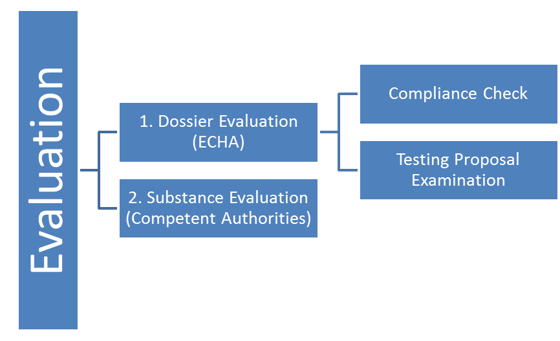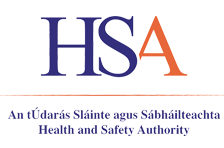Evaluation
Evaluation is a process under REACH which involves ECHA, Member State Competent Authorities and registrants. There are two types of evaluation which can be carried out; dossier evaluation and substance evaluation.

Dossier evaluation
There are two processes under dossier evaluation:
Compliance check
This applies to any registration dossier. ECHA examines the registration dossier to check if the information provided is compliant with the standard information requirements of REACH.
There are two possible outcomes of a compliance check:
- No action towards the registrant
Where ECHA finds the dossier compliant with the information requirements which were checked, ECHA will close the compliance check. ECHA may open a new compliance check on the dossier at any time. - Decision to request further information
Where ECHA finds that further information is required to bring the dossier into compliance, it will prepare a draft decision specifying the information to be provided by the registrant.
Testing proposal examination
This applies only to registration dossiers at 100 tonnes or more. Where a registrant identifies the need to perform new testing to meet the standard information requirements of REACH, they are required to submit a testing proposal to ECHA prior to commencing the study. This is to ensure that new vertebrate animal testing is only conducted as a last resort. ECHA examines each testing proposal to ensure that the studies will provide reliable and adequate data.
There are four possible outcome of a testing proposal examination:
- The testing proposal is accepted
- The testing proposal is accepted but with modifications the conditions of the test
- The testing proposal is accepted or rejected and requiring additional tests not included in the testing proposal
- Rejection of the testing proposal
In all four cases, ECHA will prepare a draft decision specifying the information to be provided/ reasons why the testing proposal is not accepted.
Further details on the dossier evaluation process can be found on ECHA’s website at: https://echa.europa.eu/regulations/reach/evaluation
Substance evaluation
This applies to any registered substance. Substance evaluation is undertaken by Member State Competent Authorities (MSCAs). The aim of substance evaluation is to clarify whether the use of a particular substance/group of substances poses a risk to human health or the environment and to decide if further information should be requested from the registrants of the substance(s) to verify the suspected concerns. Substance evaluation takes into account all registrations of the substance(s), regardless of the tonnage band.
The substances to be evaluated are listed on the community rolling action plan (CoRAP) which is published on ECHA’s website. The CoRAP is a three year rolling plan which is updated each year. It lists the names of the substances to be evaluated, which Member State is responsible for the evaluation and the year it is scheduled to be evaluated in.
There are a number of possible outcomes of a substance evaluation:
- The evaluation concludes that the risks are adequately controlled and no further actions are needed
- The evaluation identifies the need for further information to clarify the concern. In such cases the MSCA prepares a substance evaluation draft decision specifying the additional information required. These information requests can go beyond the standard information requirements of REACH.
- The additional information clarifies the concern and it is concluded that the risks are adequately controlled. No further actions are needed.
- The additional information clarifies the concern and it is concluded that the risks are not adequately controlled. In such cases, further risk management measures may be proposed, such as harmonised classification under the CLP Regulation, restriction or identification as a substance of very high concern under REACH or other actions outside the scope of REACH.
- The additional information does not fully clarify the concern and further information is needed. In such cases the MSCA will prepare a second substance evaluation draft decision.
Further information on the substance evaluation process and the latest CoRAP can be found on ECHA’s website at: https://echa.europa.eu/regulations/reach/evaluation/substance-evaluation
Decision making procedure
For dossier and substance evaluation, draft decisions may be prepared requesting further information. ECHA sends these draft decisions to registrants for commenting and registrants have 30 days to provide comments. ECHA takes into account the comments of the registrant before circulating the (revised) draft decision to Member States for review.
Where no Member State comments on the draft decision, ECHA finalises the decision and issues it to the relevant registrant(s).
Where a Member State submits a proposal to amend the draft decision, the draft decision is referred to ECHA’s Member State Committee for agreement. Registrants are given 30 days to comment on any proposals for amendment(s) submitted by Member States. The proposals for amendment(s), and any comments by the registrant(s) on them, are taken into account by the Member State Committee. Following agreement of the (revised) draft decision by the Member State Committee, ECHA finalises the decision and issues it to the relevant registrant(s).
Where the Member State Committee does not reach agreement on the draft decision, the draft decision is referred to the European Commission for decision making.
Tips for registrants
|
Further recommendations for registrants can be found on ECHA’s website at: https://echa.europa.eu/recommendations-to-registrants
